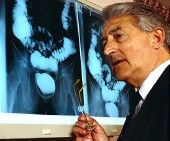Article Examines Use of 'Key Opinion Leaders' in Drug Sales
Influential doctors known as "key opinion leaders" are paid generous fees to influence their peers to prescribe a company's drugs and may in fact be considered salespeople by the industry, according to an article in the June 21 issue of BMJ.

FRIDAY, June 20 (HealthDay News) -- Influential doctors known as "key opinion leaders" are paid generous fees to influence their peers to prescribe a company's drugs and may in fact be considered salespeople by the industry, according to an article in the June 21 issue of BMJ.
Ray Moynihan, from the University of Newcastle in New South Wales, Australia, describes the use of "key opinion leaders" or "thought leaders" by the pharmaceutical industry, as influential doctors used to advise on marketing and help boost drug sales. A former drug company sales representative notes that key opinion leaders are considered salespeople, are routinely evaluated for their ability to increase sales, and often can influence their peers better than drug representatives.
The use of key opinion leaders is a global phenomenon, Moynihan notes, and influential doctors can make $3,000 or more for a single speech, typically at an educational event sponsored by a company. The medical director at the Association of the British Pharmaceutical Industry rejected the idea that such payments are bribes but simply payment for work done, and suggested that disclosure of company payments should be routine. A Harvard University researcher argues that such payments are not necessarily corrupt, just not in the public interest, and that industry influence over the medical profession should be reduced.
In accompanying editorials, Charlie Buckwell, of Complete Medical Group in Macclesfield, United Kingdom, argues that thought leaders are necessary for medical advancement, while Giovanni A. Fava, M.D., from the University of Bologna in Italy, argues that they threaten scientific integrity.
Full Text - MoynihanEditorial - BuckwellEditorial - Fava
Copyright © 2008 ScoutNews, LLC. All rights reserved.